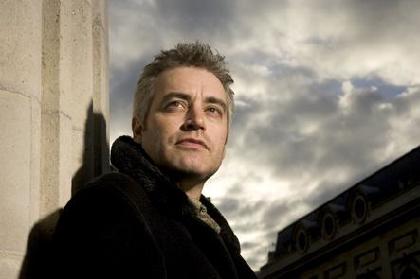- country:United Kingdom
- style(s):Songwriter
- label:Rebel Group
- artist posted by:Unique Gravity
Links
After placing his music career on hold while going to work as a best-selling author, John Wesley Harding returns with his first new album in five years, Who Was Changed And Who Was Dead. Along with the record he will unveil a new show at ManhattanA's Le Poisson Rouge in the New Year: John Wesley Harding's Cabinet of Wonders will feature some of Harding's favorite collaborators from the literary, comedy, musical and even ventriloquial worlds in a variety show format.It's time to bring the writing and the music together under the same flag for a night or two,says Harding. Already confirmed for these three dates (February 11, March 11, April 15) are Colson Whitehead, Rick Moody, Jonathan Ames, Dawn Landes, Eugene Mirman, Josh Ritter and Colm McCann. The only criterion is that I love the work of everyone performing. It's that simple. Since his much-lauded debut Here Comes The Groom on Sire Records in 1990 (declared the first great rock record of the '90s by Robert Hilburn in the LA Times), Harding has been single-minded in his pursuit of pop perfect songcraft. He's explored many of the darker corners of contemporary music, from traditional folk to garage rock, even recording an a capella record just for good measure. His songs have been featured in movies such as High Fidelity, and he has recorded duets with Bruce Springsteen, Lou Reed and Josh Ritter among others. One might be forgiven for thinking that he's been quiet of late. It's as if he wouldn't release another album while there was a right wing government. What's he been up to for the last five years? A lot. Under his real name, Wesley Stace, he wrote two novels, both published by Little Brown (USA) and Jonathan Cape (UK): the international bestseller Misfortune, nominated for a slew of awards including The Guardian First Book Award and The Commonwealth Writer's Prize, and by George, a New York Public Library Book to Remember of 2007. A third is recently completed, slated for publication in late 2009. He was also the subject of an ambitious concert movie (released on DVD), A Bloody Show, filmed at Seattle's Bumbershoot, featuring the songs from Misfortune performed by an a capella group, a string quartet and a rock band, with Robyn Hitchcock in the role of the narrator. But now it's back to business: there's a new record on the table. And it's clear that Harding is doing what he does best, while managing to make it all seem effortless and fun. Who Was Changed And Who Was Dead feels brand new, yet familiar that's not surprising. The record is, in a way, and by coincidence, a summation of my career certainly with regards to the cast. There's Steve Berlin of Los Lobos who produced Why We Fight in 1992; Kurt Bloch, producer of Trad Arr Jones in 1999; Robert Lloyd who I've been playing with live for eighteen years; old friends Peter Buck, Scott MacCaughey and Bill Reiflin of The Minus Five, Young Fresh Fellows, Ministry, etc., not to mention their little side project REM; Kelly Hogan who used to live in the apartment beneath me in Atlanta in 1990; Mike Viola, a recent collaborator here in New York, who co-wrote three of the songs. Rob Seidenberg, who signed me to Hollywood and Mammoth Records, oversaw the recording of the basic tracks. Somehow it's like everyone in my career ended up on this record. Add guitarist Earl Slick (David Bowie, John Lennon) to that and I think you have a potent combo. Harding notes: Like many things in life, this record happened by chance. There was the kind offer of some studio time in Portland, and a bunch of my musical friends are in the Northwest, where I used to live, so I gathered everyone there. I wouldn't even say I was rushing to make a record at that particular time, but I'd always intended to do a proper project with The Minus Five, so I picked the best recent songs, and decided to cut it all live. I went in to make something quite basic and emerged, from a studio in Manhattan where we did the overdubs, with something rather elaborate. In the opening lines of the first song on the record, the epic My Favourite Angel, the narrator seems to be reflecting on the beauty of a treacherous ex. But it soon becomes clear that something else is going on entirely. It's a quintessentially JWH moment rock's lazy metaphors stripped away: Angel Eyes? He's loving Angels instead? Forget it. It's God singing to Lucifer, his fallen star. People are very bad at forgiveness, so I decided to write about the ultimate act of forgiveness. I like an active listener. There has to be more than one thing going on or the songs aren't any fun. I mean, I realize I'm in a little ghetto here, trying to communicate with lyrics and making the records sound as warm and beautiful as possible. But what can I say? I'm attached to it. You can blame Bob, Neil, Joni and Leonard, Warren Zevon, John Prine, Randy Newman same people as always, the ones I name-checked in Bastard Son on my first record. The musical influences are much broader now; the lyrical influences never changed. Top of the Bottom comes on like memoir and seems to be autobiographical, a bildungsroman from Harding's days busking in the town centre of Hastings. But surely we'd know if he'd been on Celebrity Survivor following an arrest for necrophilia. The song is a kind of tribute to Bret Easton Ellis last novel Lunar Park, in which he depicts a completely fictional version of himself, married and living in the suburbs. I thought it would be a good idea to approach my career in the same way. I guess it's a parody of the memoir, which appears to be the dominant literary form at the moment. Unfortunately, my childhood was quite happy, so, robbed of material, I'd have to make something up. My novel Misfortune came from a song; maybe I'l base my memoir onTop of the Bottom.Whether it's the rapid-fire verbal apocalypse of The End, the seductive snap-crackle-and-pop of Love or Nothing, the acid put-downs of Congratulations (on your Hallucinations) and Sick Organism, or the cunning, sympathetic character studies of A Very Sorry Saint and Wild Boy, Harding refreshes the parts many lyricists could not, or would not bother, to reach. Musically, there seems to be a little bit of everything on the record. Many of my favorite singer-songwriters have made albums more-or-less ruined by a type of production that was vogue at that time, in a style that detracted from their songs. In fact, it's hard to think of one who hasn't. On the new record I went in the opposite direction. I wanted every single song to dictate its own arrangement, and luckily I was playing with musicians who could handle that. Some songs I wrote on the piano; some were folkier; some sounded rock n roll to me. So let them be themselves. The downside is no one ever knows quite what to call your music; but that's also the upside. The influences, musical and otherwise, are as always legion: quotations from outsider artists Henry Darger, The Lovin Spoonful, Werner Herzog, and G.W. Pabst. Pop Culture is never far from the surface. Celebrity Survivor, The X Files, Jesus Christ Superstar, David Bowie: somehow all are name-checked. And how about the line The video star was killed by reality An offhand Buggles reference, sure, but much more. It's a mess up there,says Harding, tapping his forehead, but it's all jangling around quite happily and it has to come out somehow. Best not make too many rules. And, lastly, the album cover and title. My wife, Abbey, drew that fantastic picture a few years ago, and I've had my eyes on it ever since. Her piece didn't have a title and nor did my album. I recently read Who Was Changed And Who Was Dead by Barbara Comyns, a very strange, rather frightening book written in 1955, about the effects of an outbreak of ergot poisoning in a small rural village, and the title just seemed to fit the picture, so I suddenly had a name for the record. It's not a question, you know? If it were, there i'd be a question mark. It's a statement: the record tells you who falls into which category. I've never been afraid of death, so that cover looks very beautiful to me, stunning. Who Was Changed And Who Was Dead is released by Popover Corps Records, through The Rebel Group.



